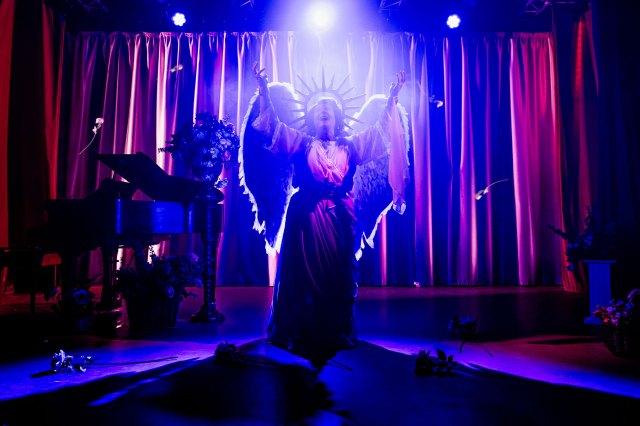Glorious! at Hope Mill Theatre – review
Kirk Jameson’s production, starring Wendi Peters as Florence Foster Jenkins, runs until 30 March

It’s a hard pitch. A show about a singer who can’t sing but does so anyway, out of defiance, delusion or both. And then there is the actual hard – or harsh – pitch that comes out of her: glorious, it is not.
But Glorious! knows that. Just look at the title with its exclamation mark, mischievously echoing both the conviction of Florence Foster Jenkins, the infamous amateur soprano, and the mocking scoff of her critics. It also knows it too much. Peter Quilter’s script ridicules Jenkins more than it ever empathises with her.
Forget undertones and subtlety; every other line has deafening levels of knowing double meaning in a way that feels increasingly pleased with itself. “Once they see madam perform, they rarely come back,” goes one. “This hall will never hear a sound like that again,” goes another. Many of these are delivered by Charlie Hiscock’s droll accompanist Cosmé McMoon. He also serves as our narrator, recalling Jenkins’ growing fame, which culminates in her improbably bagging a show at the prestigious Carnegie Hall.
The show feels starchy, featuring old-fashioned comic gimmicks like the language barrier of Jenkins’s Italian cook. But scenes are also repetitive: a breezy bit of set-up before Jenkins starts butchering a piece of classical music while McMoon squirms behind her. And Wendi Peters essentially plays Jenkins as Patricia Routledge’s Hyacinth Bucket, with the same rolling eyes and grin, which is a sometimes distractingly close impersonation. Her delivery can also be overly precise and deliberate, as if playing notes rather than organic thoughts, so punchlines become even more heavily signalled.
However, Peters drives through the creakiness with enough eccentric vim. She doesn’t just crash through keys amusingly; the comic detail of her performance is as much in her face as her voice. Her lips wobble and wriggle to make tunnels with her mouth, as if wrestling with the songs, her own voice trying to escape out of her. Outside of the recitals, her singsong voice opens each line with a high note – the threat always looming that she might burst into song. Even her laugh flutters and her eyes glisten at the mere twinkle of a call bell.

But just as she’s accused of steamrolling notes, her character almost steamrolls the story. We see little development of her and McMoon’s relationship, while their backstory becomes background notes. Quilter’s script could do much more to explore how her singing is a rebellion against the controlling father who cut her off and told her she couldn’t sing. Likewise, the suggestion that McMoon’s homosexuality makes him a similarly misunderstood figure in 1940s America is faint.
Instead, we are spoon-fed more obvious, trite messages. One of Jenkins’s fans, for instance, calls her “A symbol to all those who dreamed but never dared”. And it’s unafraid of its own symbolism: a large peacock on a screen behind her during one performance, or her wearing an angel costume while McMoon eulogises her following her death.
McMoon warns against “rose-tinted spectacles“ that make our perception “all bright and pink”, but the show’s own palette lacks darkness and murk. We don’t get much impression of McMoon bordering on exploitation – supporting her performance at Carnegie Hall even though it could bankrupt her, to pursue his own career ambitions. When he tells her he admires and loves her, it feels too sincere, not to mention unconvincing, considering all his sarcasm and side-eye.
It all makes Glorious! an ironic way for the Hope Mill – a theatre whose success is built on high-powered musicals and vocal prowess – to celebrate its tenth anniversary. But then, with its story of a character finding her voice, perhaps it’s not so far from a musical after all.















